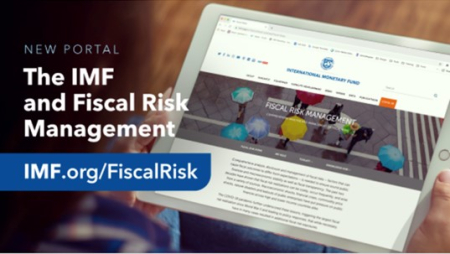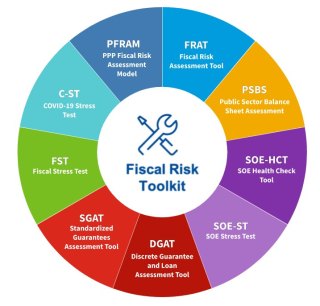
By Carolina Renteria, Jason Harris, Amanda Sayegh, Lesley Fisher, and Nathalie Carcenac[1]
During economic crises, macroeconomic shocks are often compounded by a cascading realization of fiscal risks as one domino falls after another. The realization of these risks entails additional calls on public resources, during already challenging fiscal circumstances, and arise from a wide variety of sources: bailouts of state-owned enterprises (SOEs), calls on government guarantees, and loan write-offs. Fiscal risks from macroeconomic shocks and other sources have been responsible for four-fifths of the unexpected increases in country debt to GDP ratios over the past 25 years.
What if there was a way to know where these risks are likely to come from, and their possible fiscal costs, so that action can be taken in advance to reduce their impact or ensure that the government is well placed to act as shock absorber during the most difficult times?
Today the IMF is launching a Fiscal Risk Management Portal―a one-stop-shop for fiscal policy makers to access the latest in fiscal risk management tools and guidance. The portal provides a new Fiscal Risk Toolkit for governments to better identify, assess and manage fiscal risks. It brings to bear the accumulated knowledge from the IMF’s engagement with a wide range of countries to put that into perspective, reflects lessons learnt through previous crises, and incorporates tools developed to address the challenges of the COVID-19 pandemic and its impacts on governments and people around the world.
The COVID-19 pandemic has once again underscored the importance of better understanding and managing fiscal risks. It triggered marked increases in government debt as governments absorbed the shock and stepped in to help their citizens with new financial support policies. These policy responses, while necessary, have contributed to a buildup in fiscal risk exposures that are likely to create fiscal policy challenges into the future.
The more policymakers understand these fiscal risks, the better placed they are to manage and accommodate them, which would enable more resilient public finances and macroeconomic stability.
Fiscal Risk Toolkit
The new Fiscal Risk Toolkit provides a practical basis for countries, at different levels of capacity, to identify, analyze, manage, and disclose different sources of fiscal risks.
The new tools released today on the Fiscal Risk Portal are:
- The COVID-19 Fiscal Stress Test module, which helps governments build scenarios to assess the impact of COVID-19 and policy responses on the economy and the budget.
- The Fiscal Risk Assessment Tool, which provides a high-level perspective on a wide range of fiscal risks which governments are typically exposed to and helps countries to identify their most important sources of fiscal risk which can be the focus of more detailed quantification using specific tools in the Fiscal Risk Toolkit.
- The SOE Health Check Tool, which assesses the financial vulnerability and risks emerging from SOEs and helps to identify those SOEs that pose higher risk and thus should be subject to more intense monitoring and in-depth analysis.
- The SOE Stress Test Tool, which provides a forward-looking assessment of the resilience of key SOE finances under a range of scenarios and their potential impact on public finances, and also facilitates benchmarking of SOE performance against peers.
These tools have been informed by earlier capacity development engagement with IMF member countries and different tools have been piloted in around 40 countries.
In addition, the toolkit brings together some of the IMF’s existing fiscal risk assessment tools and methodologies that were already in use prior to the pandemic: the Public Sector Balance Sheet Assessment, the Fiscal Stress Test, and the PPP Fiscal Risk Assessment Model (PFRAM) which is co-produced with the World Bank.
These tools can form a key component of policy makers’ fiscal policy apparatus. The tools, and their step-by-step user guides, are available for you to download directly, input country specific information, and use them to strengthen fiscal risk analysis and management, inform fiscal policy development, and improve fiscal transparency.
Knowledge Hub
The IMF has long emphasized the importance of understanding and managing fiscal risks as part of its surveillance and capacity development activities. The Fiscal Risk knowledge hub brings together the IMF’s guidance material, analytical work, and country examples on fiscal risk management that have been developed in recent years.
To learn more about the Toolkit and how the IMF can help support Ministries of Finance and governments to apply these tools to their country specific circumstances, visit the IMF’s Fiscal Risk Management Portal.
[1] IMF.
Note: The posts on the IMF PFM Blog should not be reported as representing the views of the IMF. The views expressed are those of the authors and do not necessarily represent those of the IMF or IMF policy.









